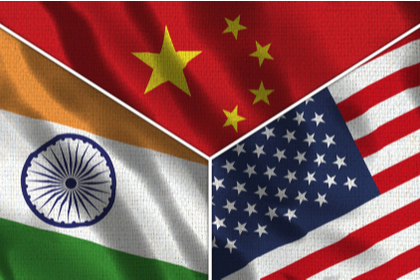Strengthening India’s space reforms
India needs a policy mix that nurtures the Space 2.0 industry, secures it from hostile takeovers and predatory investments from overseas investors, and does not suffocate it under excessive protectionism.
 Courtesy: Getty images
Courtesy: Getty images
India needs a policy mix that nurtures the Space 2.0 industry, secures it from hostile takeovers and predatory investments from overseas investors, and does not suffocate it under excessive protectionism.
 Courtesy: Shutterstock
Courtesy: Shutterstock
The recent in-person Quad meeting attended by external affairs minister S. Jaishankar and the India-U.S. 2+2 meeting of foreign and defence ministers in New Delhi, highlights not only the big upgrade in India’s strategic relations with the U.S. but also the enhanced U.S. focus on India, the Indo-Pacific and Asia. Clearly then, the foreign policy of the next U.S. administration will impact India, Asia and the world.
 Courtesy: Shutterstock
Courtesy: Shutterstock
The record of regional cooperation on rivers since India's independence in 1947 is one of several successes, with some contestations. In contrast to the past when governments strove to divide and share river waters, the endeavor has now shifted to thinking about comprehensive river basin development which makes the process even more complex. India’s policy on transboundary river governance must now also be aware of the increasing importance of Indo-Pacific in the global geopolitics.
 Courtesy: Shutterstock
Courtesy: Shutterstock
The recently imposed import embargo on 101 items in the defence sector indicates that the government has confidence in indigineous defence-industrial capacity to fulfill the requirements of the Indian military, without resorting to imports.
 Courtesy: Shutterstock
Courtesy: Shutterstock
The delivery of five Rafale fighter jets last month is a big boost for Indian military capacity. The government's recent ban on the import of 101 defence items is a major step forward in building domestic defence-industrial capabilities. Partnering with like-minded diplomatic partners and adopting emerging technologies will help India in this endeavour.
 Courtesy: Uday Deb/Times of India
Courtesy: Uday Deb/Times of India
After the strategic digital pushback against Chinese investments and apps, India should turn its attention to the biggest Chinese domination tool – 5G. This is the mother lode that enables the efficient gathering of data, which when mined, results in product enhancement and pricing benefits to products listed in China 2025 and helps China set global standards. There is an urgency for alternate suppliers of 5G equipment and other technologies to avoid relying on China.
 Courtesy:
Courtesy:
Our Energy and Environment Fellow, Amit Bhandari was featured in an interview on The Quint Hindi. Watch the video here.
 Courtesy:
Courtesy:
Our report, Chinese Investments in India was featured in Jagran Josh. Read the article here.
 Courtesy: Gateway House
Courtesy: Gateway House
Yesterday's path-breaking reforms in India's space sector by the Prime Minister's Office, and establishment of new space agencies, are geared to encourage technology innovation and direct participation by corporations, startups and MSMEs. The reforms will help India leverage Industry 4.0 and the astropolitics that will result. This podcast foreshadows these developments.
 Courtesy:
Courtesy:
Our report, Chinese Investments in India was featured in Mumbai Mirror. Read the article here.